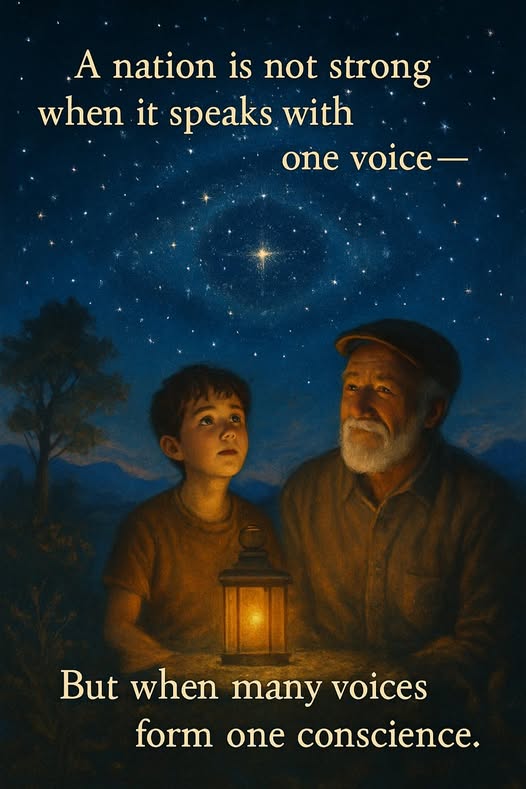
(A Classroom Simulation in Moral Leadership…continuing Emil’s journey in the mock parliament)
The school auditorium had transformed overnight. Flags from different nations adorned the walls, mock press booths were assembled, and placards marked the desks of “Ministers,” “Public Representatives,” and “Foreign Delegates.” At the center stood Emil, seated at the table labeled “Leader of the Nation.”
The simulation began.
A student playing the role of a foreign journalist stood up, pen poised. “Mr. Leader,” she asked, her voice firm but respectful, “your country is marked by deep internal differences—ethnic, ideological, religious. Some say these divisions make the nation weak. Others say it is precisely these differences that must be erased for unity. What is your policy? Will you aim to unify or to eliminate the difference?”
The room went quiet.
Emil froze. The question was sharp. And real. He glanced toward the back of the room where his grandfather sat silently among the observers. Their eyes met, and in that moment, Emil remembered the conversation from the night before—the metaphor of the flame, the role of a gardener.
He stood.
“I believe,” Emil began slowly, “that difference is not the enemy of unity. Division is.”
He took a deep breath.
“A garden is not weakened because it contains many kinds of trees. What weakens it is when the trees stop growing toward the light—when they start choking each other’s roots.”
He walked out from behind the desk, speaking directly to the room now, his voice steady.
“True leadership does not mean eliminating difference. It means creating a system where difference is not weaponized—where disagreement is not treason, and identity is not a political fault line.”
Another student playing a domestic opposition leader raised his hand. “But isn’t that idealistic? In reality, some groups don’t just disagree—they oppose the very fabric of the nation. What then? Should we still protect their voices?”
Emil hesitated—then answered with a question of his own.
“If a fabric tears, do we discard the thread—or do we examine the tension that caused it to snap?”
The opposition fell silent.
Emil turned toward the moderator, signaling he was done. But as he sat, his grandfather raised a hand—not to ask, but to be acknowledged. The teacher nodded.
The old man stood.
“May I speak?” he asked, addressing the entire room now. “Only briefly.”
He walked to the center.
“There’s a question we’ve stopped asking in politics,” he said. “Not ‘what is your stance?’ but ‘what is your stance rooted in?’ If it is rooted in fear, it will shrink the world. If it is rooted in pride, it will scorch the land. But if it is rooted in conscience, in humility before God and compassion for creation, then it may just bear fruit.”
He looked at Emil.
“Do not aim to make your nation all the same. That is the work of tyrants. Instead, teach your people to disagree without dehumanizing, to debate without dividing. That is the work of statesmen.”
He bowed slightly and returned to his seat.
The session ended, but silence lingered.
Not the quiet of peace—but the silence before a storm.
Outside, dusk crept in like ink on parchment.
Tomorrow would not be a continuation.
It would be a confrontation.

